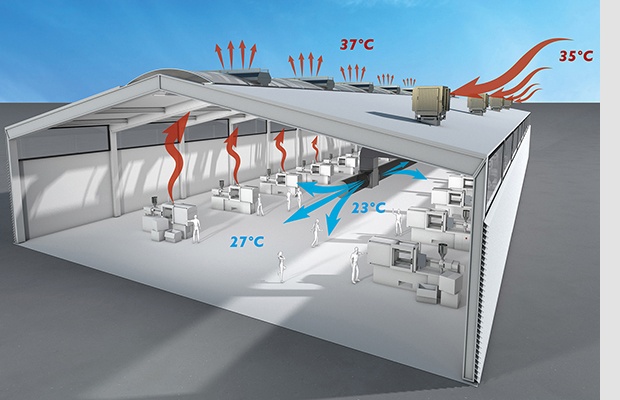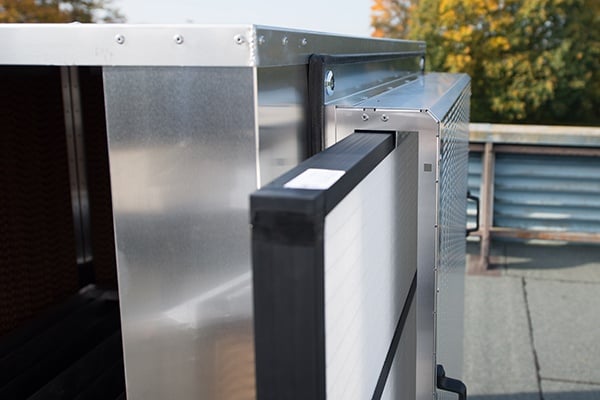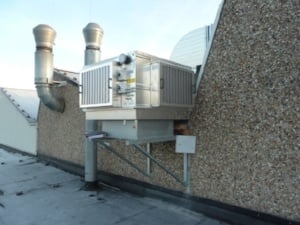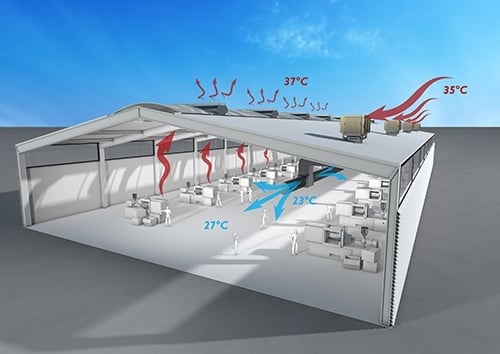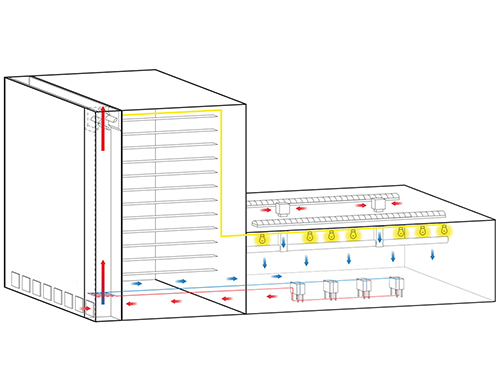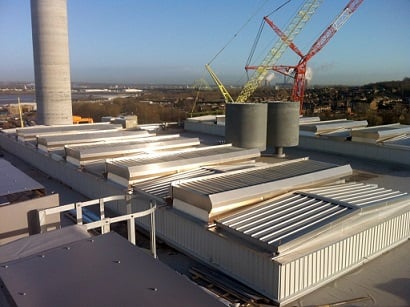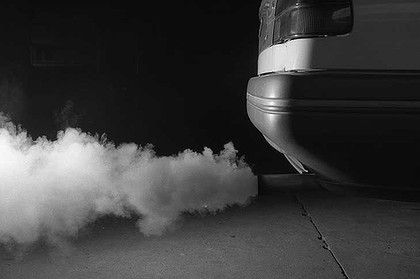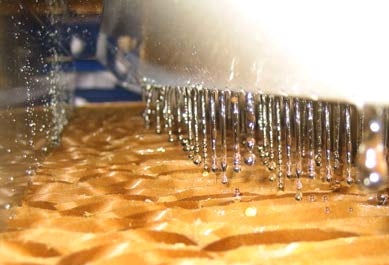Did you know that evaporative cooling systems can help you ensure that the air your staff breathe inside your buildings is actually cleaner than the air outside of it?
If you didn’t, keep reading to find out how evaporative cooling units could help you create a healthier, more productive workplace year-round.
What are the health benefits that evaporative cooling offers your staff?
Read More
Topics:
Climate Control,
Evaporative cooling,
adiabatic cooling
Evaporative cooling or ‘adiabatic cooling’ is a mouthful, we know. That’s why a lot of building owners and operators still don’t know about the effectiveness of these systems and the cost and environmental benefits they can deliver.
Many people don’t realise that if you manage a large industrial or semi-industrial facility where pinpoint control of temperature isn’t crucial, evaporative cooling can actually be a more effective choice than traditional air conditioning. Plus, have a look at the pros and cons associated with the different system types below – not only is evaporative cooling cheaper and more efficient, it introduces fresh air from outside avoiding poor health issues often associated with traditional systems.
Read on to find out what evaporative cooling is and why it could be better for your business than a traditional air conditioning system.
Read More
Topics:
Factory Survey,
HVAC,
Energy saving,
Climate Control,
Overheating,
Evaporative cooling
The quick answer is: in most cases. Power plants generate large amounts of internal heat and tend to be in tall buildings, which present ideal conditions for natural ventilation to work at its most efficient.
Read More
Topics:
Natural ventilation,
CFD,
Energy saving,
Climate Control,
Industrial ventilation,
Power Plants
Various food and beverage sectors have different climate control requirements, depending on the processes being carried out. However, they all share an overriding concern for overheating and hygiene in order to protect their goods and ensure quality.
Read More
Topics:
Climate Control,
Evaporative cooling
Air filters are used in heating, ventilating and air conditioning (HVAC) systems to improve air quality in indoor working environments. They can also serve to protect the HVAC equipment.
Read More
Topics:
Climate Control,
Evaporative cooling
As a factory manager, you may find that in spite of keeping your mechanical ventilation system in perfect condition, the temperature in your plant is increasing. Over the years, the use of your building may have changed, as with the introduction of lean manufacturing practices, there may be a higher density of production machinery with consequent higher heat load in some areas of your facility. This means that the mechanical ventilation system as it was originally designed and installed no longer meets your requirements.
Read More
Topics:
Factory Survey,
Climate Control,
Evaporative cooling
I received some excellent questions during my recent webinar on evaporative cooling. Here you can see my answers to these questions, slightly edited for clarity.
There is also a recording of the webinar available.
Read More
Topics:
Webinar,
Climate Control,
Evaporative cooling
Are you a UK business with more than 250 employees? Does your business generate at least £40 million in annual turnover and have a balance sheet of more than £34 million? If the answer is yes to either question, you are required to complete an energy efficiency audit by 5 December to comply with the government’s Energy Saving Opportunity Scheme (ESOS). Should you fail to comply, you risk a fine of up to £50,000.
Read More
Topics:
Energy saving,
Climate Control
Today’s blog article is a bit different from our usual contributions: we were recently involved in an unusual project with a client who thinks very much out of the box, which resulted in an ingenious solution that we thought could be interesting for you.
Read More
Topics:
Energy saving,
Climate Control,
Evaporative cooling
In my opinion, a natural ventilation system should always be the first choice for power plants, energy from waste, biomass, hydro stations, transformer stations and other similar buildings for 2 reasons:
1) The Environment
The number and frequency of extreme weather events has been on the increase throughout the world. The climate is changing, of that there is no doubt, and the most popular theory is that this is due to the rise in CO2 emissions.
Read More
Topics:
Natural ventilation,
Energy saving,
Climate Control,
Power Plants
Condensation forms when humidity is so high that the air is saturated and can’t take on any more moisture. The solution to the problem is not complicated, but you need to be sure you are measuring the right variables to identify the best method to resolve it.
When does condensation become a problem?
Read More
Topics:
Climate Control,
Overheating,
Industrial ventilation,
Humidity,
condensation
Controlling diesel engine exhaust emissions in enclosed spaces such as maintenance workshops is easily done with local exhaust ventilation (LEV), which can be as simple as fitting pipes to the vehicles’ exhausts while they are being serviced in order to draw the fumes outside. However, there are situations where this is not an option, for example in a warehouse where there is heavy vehicle movement inside the building, as vans and lorries come in and out for loading and unloading.
Read More
Topics:
Smoke ventilation,
Climate Control,
Industrial ventilation
Who doesn’t love the smell of freshly roasted coffee? But there can be too much of a good thing, and coffee roasting facilities have more to worry about than an excess of fragrance: they have to cope with the high levels of heat generated, which becomes even more of an issue during the summer months, as well as the build-up of carbon monoxide concentrations in the 72 hours following the roasting process. Efficient ventilation to extract the excess heat and carbon monoxide is essential.
Read More
Topics:
CFD,
Climate Control,
Overheating,
Evaporative cooling,
Industrial ventilation
At our recent CPD accredited evaporative cooling webinar, I received some interesting questions in the Q&A session at the end. I would like to share my answers, which have been edited to make them clearer.
Q: How do you deal with freezing conditions?
A: During colder periods, where freezing outside conditions would be expected, the evaporative coolers would not be used, and they would have been earlier drained down and isolated as part of a winterisation process. This means that there is no chance of any water freezing inside the unit, as it contains no water.
Freezing conditions are then dealt with by carefully mixing quantities of that cooler outside air with warmer waste air from the IT equipment, therefore providing air at desirable conditions.
Read More
Topics:
Webinar,
Climate Control,
Evaporative cooling,
Data Centre,
CPD
The benefits of evaporative cooling in warehouses and industrial buildings are many: it is a highly energy efficient technology, that uses no refrigerants, provides a pleasant indoor climate, is simple and easy to maintain and, last but not least, running costs are four to seven times lower than traditional air conditioning solutions – and they are even lower in data centres.
Read More
Topics:
Energy saving,
Climate Control,
Evaporative cooling,
Data Centre,
Whitepaper


